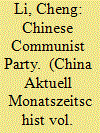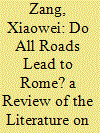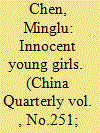| Srl | Item |
| 1 |
ID:
091521


|
|
|
|
|
| Publication |
2009.
|
| Summary/Abstract |
This article explores two interrelated aspects of the new dynamics within the CCP leadership - the new elite groups and the new ground rules in Chinese politics. The first shows profound changes in the recruitment of the elite and the second aims to reveal the changingmechanisms of political control and the checks and balances of the Chinese political system.The article argues that the future of the CCP largely depends on two seemingly contradictory needs: how broad-based will the Party's recruitment of itsnew elites be on the one hand and how effective will the top leadership be in controlling this increasingly diverse political institution on the other.
|
|
|
|
|
|
|
|
|
|
|
|
|
|
|
|
| 2 |
ID:
193140


|
|
|
|
|
| Summary/Abstract |
Political elites have a tremendous influence on past, present and future socioeconomic and political developments in both western and non-western countries. Unsurprisingly, the analysis of China’s elites has been crucial in the study of politics there. A large body of literature has examined the members of the Central Committee of the Chinese Communist Party, a stronghold of the nation’s political elites. Given the growing interest and research on elite politics in the PRC in recent years, this paper reviews studies of the pathways to political power and the personal qualifications of the members of the Central Committee that are central to studies of elite Chinese politics. This review paper is organized both chronologically and thematically. It shows a shift away from the study of demographics of Central Committee members toward theorizing of how recruitment into the Central Committee works. Some scholars have theorized succession politics in China as the rise of technocracy, while others have used institutionalization and factional politics to explain how China’s leaders are selected. This paper summarizes and identifies several theoretical and methodological issues in existing studies as an effort to advance research on succession politics and political evolution in China.
|
|
|
|
|
|
|
|
|
|
|
|
|
|
|
|
| 3 |
ID:
186941


|
|
|
|
|
| Summary/Abstract |
There are few women among China's local political leadership. Current scholarship on the topic co-locates women's political participation with the representation of other marginalized social groups. In particular, it is argued that female politicians are simply tokenistic representatives of the marginalized: female, intellectual, ethnic minority and non-Communist Party members. An examination of those women who have served in provincial leadership positions over the last two terms suggests that such a characterization is misleading. Rather, the evidence indicates that women have been appointed on the same grounds as male leaders in terms of age, education, CCP membership and experience. Gender disparities in the selection of provincial leaders are in fact considerably more nuanced and can be traced to the lack of institutionalized policies and processes as well as women's ongoing disadvantages in education, political networks and training.
|
|
|
|
|
|
|
|
|
|
|
|
|
|
|
|